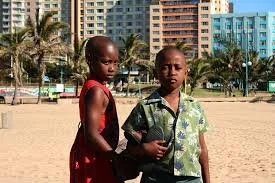Film reviews: Beyond Moving's bittersweet ballet story and street kids in Durban, at South African Film Festival
Story of rising National Ballet star Siphe November moves in more ways than one
Siphe November backstage in Beyond Moving
Beyond Moving and Izulu Lami stream at the South African Film Festival until November 12
TWO STRIKINGLY SHOT FILMS AT the South African Film Festival, one a documentary and the other fictional, tell affecting stories about Black village youth transitioning to urban life.
To their credit, neither oversimplifies that journey.
Dance fans will not want to miss Beyond Moving, a documentary about young National Ballet of Canada standout Siphe November, who showed such talent that he was plucked from a Western Cape township at 11 and brought to the company’s Toronto school to train.
Sponsored by a white Canadian family who recognized his potential, he has gone on to become an expressive force, the most electric shown here as the teenage soloist in Alberta-born choreographic sensation Azsure Barton’s Come In.
But there’s much, much more to ponder in director Vikram Dasgupta’s portrait of the dance artist, shot over years. November is one of five children raised amid poverty by a single mother in Zolani. He’s taken into a program run by devoted ballet teacher Fiona Sutton, and it’s there that his gifts become clear; even in the rough home movies here, the elementary-schooler will blow you away with his raw technique and expressivity.
It’s clear he is surrounded by love and happiness in a culture for whom dance is an ingrained part of celebration, connection, and just being. And that’s what makes it more than a little bittersweet when it’s time to leave his beloved mother and brothers. Cue scenes of grey Toronto streets and the kind of disciplined ballet classes where teachers push the students to raise their three-quarter points and present the heel. Dasgupta shows one clip in which a young November is admonished for disrupting a Remembrance Day rehearsal, and it’s just a small hint of what must have been a massive adjustment.
The story jumps forward six years, and we see a confident, honed November, now in his late teens. But there’s still an ache for the culture he’s left. When he makes an emotional homecoming with his best friend from the National, Sutton expresses resentment; part of it is that she hasn’t gotten enough recognition for nurturing his early talent. But she also expects him to share more of his experience with Zolani, to actively encourage the child dancers still there. And you can’t help but feel sorry for the responsibilities he must carry on his still-young shoulders.
Offstage, November keeps a lot of those pressures to himself; in rare candid moments the teen expresses how much he misses his culture. During one scene he mourns the loss of Xhosa, the native tongue he’s mostly forgotten in his years abroad.
He only seems to feel like he fully belongs in Zolani, a place that keeps drawing him back. And later in the movie, after an emotional graduation and a tearful reunion with his brother, also a dancer, he returns to the streets of the township, performing his own form of ballet-fusion to the sounds of a South African singer, in the glow of car headlights. You get the sense that he’s still trying to integrate the love of his homeland with his far-removed art. Through movement, he expresses that push-and-pull and a sense of loss in ways he seldom does in words.
Izulu Lami
Elsewhere at the fest, director Madoda Ncayiyana’s Izulu Lami (My Secret Sky) tells a story of street kids that’s more in the tradition of Brazil’s City of God or the Lebanese Capernaum.
The 2008 film draws incredibly naturalistic performances from kids recruited from townships and rural settlements. The intense-eyed young Sobahle Mkhabase is a knockout.
Izulu Lami defies its low budget with some gorgeous early imagery of the KwaZulu-Natal countryside, and drives the storytelling with the rhythms of traditional music.
The film follows 10-year-old Thembi (Mkhabase) and her eight-year-old brother Khwezi (Sibonelo Malinga). After their mother dies, they suddenly find themselves living alone in their clay-wall hut in rural KwaZulu-Natal.
Carrying their only possession of value, their mother’s handwoven mat, they set out for Durban. The journey takes them through rolling hills, golden grasslands, and eventually along the region’s historic railway. Those images contrast the gritty reality of the city, where the naive children fall in with a group of streetkids. Theft, drugs, and sexual predators are just some of the threats the pair face as they try to survive.
Izulu Lami is not always polished, but for Vancouverites cut off from the world, it offers a rare glimpse into a corner of South Africa, offering empathetic insight into how poverty and systemic breakdowns force children into the streets there.
And though the outcome for Khwezi and Thembi might look far removed from that of Sephi November, the movies express similar themes: resilience, the inescapable pull of home, plus the need for our mothers and motherland and the systemic poverty that forces separation from them. Together, they make a compelling, and "beyond moving", double bill.
















